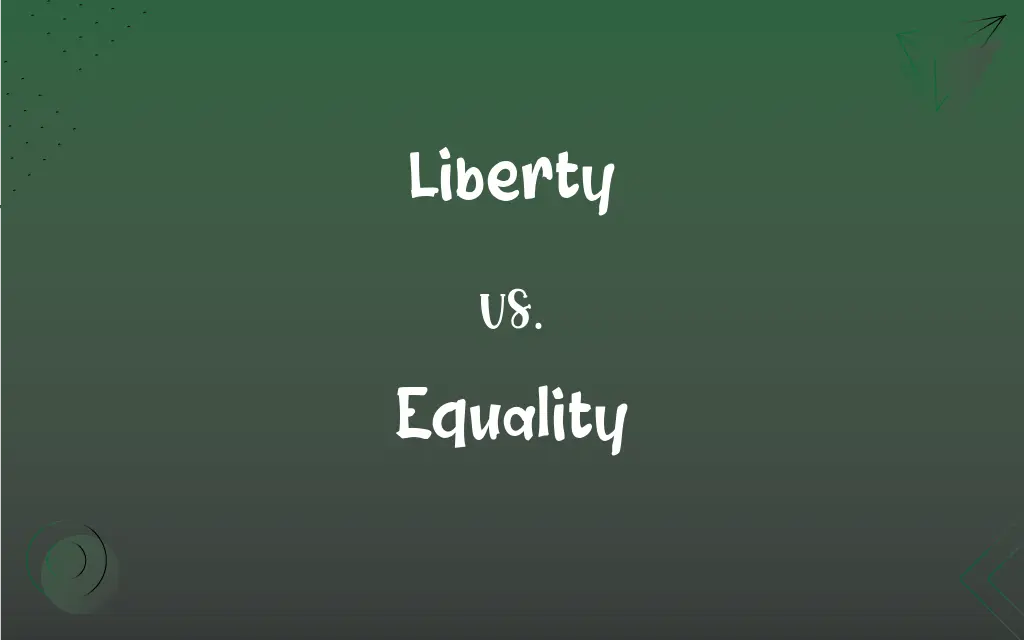Liberty vs. Equality: What's the Difference?
Edited by Harlon Moss || By Janet White || Published on December 22, 2023
Liberty refers to the freedom of individuals to act as they choose, while equality means ensuring all individuals have the same rights and opportunities.

Key Differences
Liberty is the condition of being free from oppressive restrictions imposed by authority on one's way of life, behavior, or political views. It often involves the protection of individual rights and freedoms. Equality, on the other hand, refers to the state of being equal, especially in status, rights, and opportunities. It seeks to ensure that all individuals have access to the same opportunities and are treated without discrimination.
Liberty emphasizes the autonomy of the individual and their right to make choices without external interference, highlighting the value of personal freedom and self-determination. Equality focuses on creating a fair and just society where every individual has the same chance to succeed and is not disadvantaged by their background or characteristics.
In the context of liberty, the emphasis is on limiting government intervention and ensuring that individuals have the freedom to pursue their interests. In contrast, equality often requires proactive measures to redress imbalances and disparities, potentially involving government intervention to ensure fair treatment and equal access.
Liberty can sometimes lead to inequalities if unchecked, as it allows individuals to leverage their advantages without constraints. Conversely, strict enforcement of equality can sometimes impinge on personal liberties, as it may require imposing restrictions on individuals to ensure equal outcomes for all.
The balance between liberty and equality is a fundamental aspect of political philosophy and public policy. While liberty champions individual freedom, equality strives for fairness and justice across society, making them complementary yet distinct principles.
ADVERTISEMENT
Comparison Chart
Focus
Individual freedom and choice
Fairness and uniformity in rights and opportunities
Government Role
Limited intervention, protection of freedoms
Active in ensuring equal rights and opportunities
Outcome
May result in varied success and status based on individual actions
Seeks uniform outcomes regardless of individual actions
Societal Impact
Can lead to disparities
Aims to reduce disparities
Philosophical Basis
Emphasizes autonomy and self-determination
Focuses on fairness and social justice
ADVERTISEMENT
Liberty and Equality Definitions
Liberty
Freedom from external control.
The Bill of Rights protects the liberty of American citizens.
Equality
The state of being equal, especially in status and rights.
The law ensures equality for all citizens.
Liberty
The power to act as one pleases.
With financial liberty, she traveled the world.
Equality
Fairness in opportunity and rights.
Education for all is a step towards equality.
Liberty
A right or privilege, especially of a legal nature.
Freedom of speech is a fundamental liberty.
Equality
Sameness in treatment or effect.
The company promotes equality in the workplace.
Liberty
The state of being free within a society.
Liberty allows for free expression of ideas.
Equality
Uniformity in distribution or allocation.
The new policy aims at equality in resource distribution.
Liberty
Freedom from captivity or oppression.
The revolutionaries fought for their liberty.
Equality
The absence of discrimination.
Gender equality is vital for a just society.
Liberty
The condition of being free from confinement, servitude, or forced labor.
Equality
The state or quality of being equal.
Liberty
The condition of being free from oppressive restriction or control by a government or other power.
Equality
(Mathematics) A statement, usually an equation, that one thing equals another.
FAQs
Can liberty exist without equality?
While they are distinct, their coexistence often leads to a balanced society.
What is the primary focus of liberty?
The focus is on individual freedom and choice.
Does equality mean identical treatment for everyone?
Not necessarily identical, but fair and without discrimination.
Is liberty only concerned with government intervention?
It primarily involves freedom from undue government control, but also general autonomy.
Can the pursuit of liberty lead to inequality?
Yes, unchecked liberty can result in disparities.
Is equality always beneficial?
While aimed at fairness, it must be balanced with individual freedoms.
How does equality impact society?
It aims to reduce disparities and ensure fairness.
How does a society achieve both liberty and equality?
Through laws and policies that balance individual freedoms with social justice.
Can liberty be absolute?
Absolute liberty can lead to anarchy; thus, it is often moderated by laws.
How does equality relate to rights?
Equality ensures that rights and opportunities are evenly distributed.
Are there different types of liberty?
Yes, including civil, political, and economic liberties.
How is liberty protected?
Through constitutional rights and legal protections.
Can too much emphasis on equality suppress liberty?
Yes, if not carefully balanced, it can restrict individual freedoms.
Is economic equality a part of the concept of equality?
Yes, it involves equal opportunities and access in economic realms.
Do liberty and equality always align?
They can conflict, but ideally should complement each other.
Why is equality important in a society?
It ensures that everyone has a fair chance and is treated justly.
Does equality mean the same outcomes for everyone?
Not necessarily; it's more about equal opportunities and fair treatment.
Can equality exist in a hierarchical society?
It can be challenging, but measures can be taken to promote fairness.
Is personal liberty unlimited?
Personal liberty is often limited by the need to respect others' rights.
How do governments promote equality?
Through anti-discrimination laws and policies ensuring equal access.
About Author
Written by
Janet WhiteJanet White has been an esteemed writer and blogger for Difference Wiki. Holding a Master's degree in Science and Medical Journalism from the prestigious Boston University, she has consistently demonstrated her expertise and passion for her field. When she's not immersed in her work, Janet relishes her time exercising, delving into a good book, and cherishing moments with friends and family.
Edited by
Harlon MossHarlon is a seasoned quality moderator and accomplished content writer for Difference Wiki. An alumnus of the prestigious University of California, he earned his degree in Computer Science. Leveraging his academic background, Harlon brings a meticulous and informed perspective to his work, ensuring content accuracy and excellence.






































































